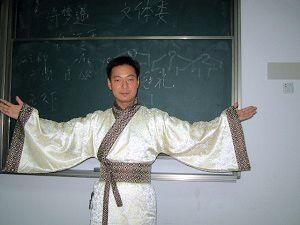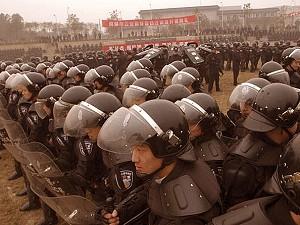Guo Quan, a China Democratic League member and now removed Associate Professor at Nanjing Normal University, published his sixth open letter on Thursday calling on Chinese people to push forward democratic reforms using a non-cooperation movement.
At the same time, overseas democratic activists held a forum in Sydney, discussing the domino effect of the open letter published by Wang Zhaojun, standing member of the Anhui Province Consultative Committee. The forum also expressed concerns about the fate of those who live in China and openly express their political opinions.
Since Wang Zhaojun published an open letter to national leaders suggesting political reform and redressing victims from the Tiananmen Square Massacre and Falun Gong, it has had a great impact worldwide. People from various walks of life have started to use open letters to propose democratic reform in China.
Guo Quan’s Non-Cooperation Movement
After several party actions against him, Guo published his sixth open letter on Thursday. Unlike the first five letters, which were written to the national leaders, this one is written to every Chinese in and outside of China. Guo called on all those who are against dictatorship and supportive of democracy to carry out a democratic reform by not leaving home for seven days.
Guo’s letter stated, “If everyone from all occupations in China stayed at home for a week, I think the effect of ”expressing a nation-wide ideology for democracy“ and the power of damaging the economy will be greater than any nuclear war.”
Guo told RFA that using a non-cooperative movement to force the totalitarian regime to listen to the people is the most effective and least costly, “The sixth letter is what I have done—action. I experimented with this type of movement many times (such as protesting against the high school cafeteria’s raising prices) and was successful. No country can stand losing tens of billions of yuan everyday. I don’t think it will take seven days, perhaps only three. I hope those around the world who wish China a democratic and prosperous future will join. Pick a day and spread this message through the Internet or text messages; it’s technically possible.”
Among them, Guo is the most persistent, with his sharp criticism and who still works in the communist system in China. In the past couple of months, Guo published many letters pointing out social problems such as jobless workers and veterans, and farmers who lost their lands. Guo suggests embracing a democratic system with multiple political parties and military nationalization. Guo was removed from his professorship in Nanjing Normal University for violating the Constitution and Teachers’ Law. Later the police interrogated him, searched his house and confiscated his computer.
Australia Forum Discusses Wang Zhaojun’s and Guo’s Letters
In the recent Australia Forum about Wang Zhaojun’s Open Letters, Chinese democratic activists also condemned the communist authority’s suppression of Guo and were concerned about his situation. Zhang Xiaogang, host of the Forum, told RFA that if Beijing couldn’t even accept suggestions trying to solve severe social conflicts, the crisis will only intensify in the future. “It’s a pity Beijing couldn’t accept such a mild way [first 5 letters] to suggest solving social conflicts,” said Zhang.
Over twenty scholars and dissidents participated in the Forum and talked about the impact of Wang’s open letter. There was information that Beijing has already appointed a deputy chair from the National Committee of the Political Consultative Conference to put pressure on Wang.
RFA called Wang on his home phone and cell phone on Thursday, but didn’t get through.
Chen Yonglin, a former Chinese consulate diplomat who defected in Sydney, told RFA that he thinks the greatest impact of Wang’s letter is it gives those who still live in China the courage to speak. “He is the highest level official in recent years who spoke courageously while still living in China. The fact that he hasn’t been suppressed means that the Communist Party paid attention to this issue and the Chinese leaders agreed with his point of view at some level. Wang’s action reduces the fear of most Chinese- it’s also a kind of progression.”




